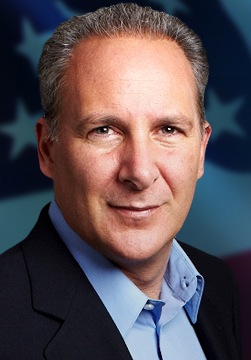Gold's Trifecta Reveals Dollar's Diminished Status
After years of trading in the euro's shadow, this week gold finally reclaimed its role as the safe haven of choice. In the last three weeks, Gold has risen against all three of the world's major currencies, reaching a new all-time high of 360 per ounce against the euro, and 47,800 per ounce against the yen, a fourteen-year high. In dollars, gold rose over 5% during that time period as well, including a $12 gain this week alone.
The fact that gold's strength comes not as a result of weakness in the dollar, but of weakness in the euro, suggests that in the minds of many, the euro has already replaced the dollar as the reserve currency of choice. By reacting to the euro, gold reveals the diminished status of the dollar. For all its flaws, the euro is perceived to be the lesser of the two evils, and is now acting like the de facto reserve currency, suggesting that the dollar's days as the official holder of that title are indeed numbered.
Further evidence of the dollar's lack of appeal is that since the euro's sharp decline in the wake of the French and Dutch "No" votes, the dollar has actually declined against many of the world's currencies, including over 2% declines against the Canadian, Australian, and New Zealand dollars.
During the past several years, gold's price only rose relative to the weakening dollar. However, it did not rise against most other currencies. That is because money fleeing the risky dollar sought safety in the euro. As a result, gold never actually rallied, even though from a U.S. dollar perspective it appeared as if it had.
However, now that fears have emerged with regard to the euro, safe haven money is going into gold. That is why over the past several weeks, the price of gold has risen sharply in terms of all currencies. In other words, this is a legitimate gold rally, not simply a dollar decline.
The fact that the dollar no longer benefits from flight to quality capital flows is particularly alarming in light of today's release of a record first quarter current account deficit of 195.1 billion. To sustain this deficit, which came in at 6.4% of GDP, the U.S. needs to borrow more than 2 billion per day from the rest of the world. Put into perspective, were this abysmal performance to be repeated for the rest of the year, (actually, it is more likely to worsen) the annual current account deficit would exceed 780 billion, over $2,600 per capita, or $10,400 per family of four!
As I have been writing, a strong euro has kept a lid on European inflation. During the last three weeks that lid has been blown clear off, with a 22% surge in the euro price of oil, as well as a 10% rise in commodity prices in general. To keep inflation from getting out of control, to stop gold's rally, and to officially take the title of reserve currency away from the dollar, the ECB needs to aggressively raise interest rates, and let the economic chips fall where they may.
My guess is that the ECB will do just that, sending shockwaves throughout the world's financial markets, with devastating implications for the dollar, the highly leveraged U.S. economy, and its financial and real estate markets. However, if the ECB, like the Fed, pulls its punches, nothing will stop gold's rise, and both the dollar and the euro will likely go down for the count.
June 17, 2005
Peter D. Schiff
President/Chief Global Strategist
Euro Pacific Capital, Inc.
20271 Acacia Street, #200
Newport Beach, CA 92660
Toll-free: 888-377-3722
Direct: 203-972-9300
Fax: 949-863-7100


















